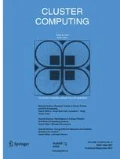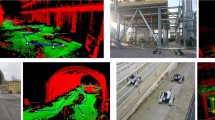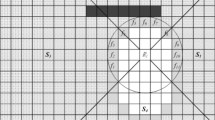Abstract
To overcome computational expensive problem in coordination of multi-robot systems (MRS) for unknown environment explorations, an integrated coordinated algorithm is proposed in this paper. The algorithm integrated predicate based reasoning and reactive behaviors to realize coordination and obstacle avoidance. An MRS partitioning strategy is proposed to reduce the scale of problem. Then, an initialization strategy realizes dispersion of robots over the environment, and task assignments at the beginning. When a robot has finished its task, predicate based reasoning is used to assign task and to realize cooperative exploration among robots. Robots explore the unknown environment through a series of zigzag trajectories. To deal with obstacle avoidance, a few of reactive behaviors are defined. Supervisors are resident in middle level of a hierarchical architecture for each robot. The results are validated by computer simulations.






Similar content being viewed by others
References
Dias, M.B., Zlot, R., Kalra, N., Stentz, A.: Market-based multi-robot coordination: a survey and analysis. Proc. IEEE 94(7), 1257–1270 (2006)
Nanjanath, M., Gini, M.: Repeated auctions for robust task execution by a robot team. Robot. Auton. Syst. 58(7), 900–909 (2010)
Ercan, U.A., Howie, C., Alfred, R., Prasad, A., Douglas, H.: Sensor-based coverage of unknown environments: incremental construction of Morse decompositions. Int. J. Robot. Res. 21(4), 345–366 (2002)
Rekleitis, I., New, A.P., Rankin, E.S., Choset, H.: Efficient Boustrophedon multi-robot coverage: an algorithmic approach. Ann. Math. Artif. Intell. 52(2–4), 109–142 (2008)
Xu, B., Chen, L.P., Tan, Y., Xu, M.: Path planning based on minimum energy consumption for plant protection UAVs in sorties. Trans. Chin. Soc. Agric. Mach. 46(11), 36–42 (2015). (in Chinese)
Chen, H., He, K.F., Qian, W.Q.: Cooperative coverage path planning for multiple UAVs. Acta Aeronaut. Astronaut. Sin. 37(3), 928–935 (2016). (in Chinese)
Zhang, K., Collins, J.G., Barbu, A.: An efficient stochastic clustering auction for heterogeneous robotic collaborative teams. J. Intell. Robot. Syst. 72(3–4), 541–558 (2013)
Ozturk, S., Kuzucuoglu, A.E.: Optimal bid valuation using path finding for multi-robot task allocation. J. Intell. Manuf. 26(5), 1049–1062 (2015)
Tsalatsanis, A., Yalcin, A., Valavanis, K.P.: Dynamic task allocation in cooperative robot reams. Int. J. Adv. Robot. Syst. 6(4), 309–318 (2009)
Burgard, W., Moors, M., Stachniss, C., et al.: Coordinated multi-robot exploration. IEEE Trans. Robot. 21(3), 376–386 (2005)
Puig, D., Garcia, M.A., Wu, L.: A new global optimization strategy for coordinated multi-robot exploration: development and comparative evaluation. Robot. Auton. Syst. 59(9), 635–653 (2011)
Julia, M., Gil, A., Reinoso, O.: A comparison of path planning strategies for autonomous exploration and mapping of unknown environments. Auton. Robot. 33(4), 427–444 (2012)
Roy, N., Dudek, G.: Collaborative robot exploration and rendezvous: Algorithms, performance bounds and observations. Auton. Robot. 11(2), 117–136 (2001)
Kuyucu, T., Tanev, I., Shimohara, K.: Super additive effect of multi-robot coordination in the exploration of unknown environments via stigmergy. Neurocomputing 148, 83–90 (2015)
Iocchi, L., Nardi, D.: Salerno M. Reactivity and deliberation: a survey on multi-robot systems. In: Hannebauer, M., et al. (eds.) Reactivity and Deliberation in MAS. LNAI 2103, pp. 9–32. Springer, Berlin (2001)
Korsah, G.A., Stentz, A., Dias, M.B.: A comprehensive taxonomy for multi-robot task allocation. Int. J. Robot. Res. 32(12), 1495–1512 (2013)
Balch, T.R., Arkin, R.C.: Behavior based formation control for multi-robot teams. IEEE Trans. Robot. Autom. 14(6), 926–939 (1998)
Ramadge, P.J., Wonham, W.M.: The control of discrete event systems. Proc. IEEE 77(1), 81–98 (1989)
Sharifi, F., Chamseddine, A., Mahboubi, H., et al.: A distributed deployment strategy for a network of cooperative autonomous vehicles. IEEE Trans. Control Syst. Technol. 23(2), 737–745 (2015)
Schwager, M., Rus, D., Slotine, J.J.: Unifying geometric, probabilistic, and potential field approaches to multi-robot deployment. Int. J. Robot. Res. 30(3), 371–383 (2010)
Yamauchi, B.: Decentralized coordination for multirobot exploration. Robot. Auton. Syst. 29(2–3), 111–118 (1999)
Dai, X.F., Jiang, L.H., Zhao, Y.: Cooperative exploration based on supervisory control of multi-robot systems. Appl. Intell. 45(1), 18–29 (2016)
Gerkey, B.P., Mataric, M.J.: A formal analysis and taxonomy of task allocation in multi-robot systems. Int. J. Robot. Res. 23(9), 939–954 (2004)
Lozenguez, G., Adouane, L., Beynier, A., et al.: Punctual versus continuous auction coordination for multi-robot and multi-task topological navigation. Auton. Robot. 40(4), 599–613 (2016)
Andre, T., Bettstetter, C.: Collaboration in multi-robot exploration: to meet or not to meet? J. Intell. Robot. Syst. 82(2), 1–13 (2016)
Nagarajan, T., Thondiyath, A.: An algorithm for cooperative task allocation in scalable, constrained multiple robot systems. Intell. Serv. Robot. 7(4), 221–233 (2014)
Nieto-Granda, C., Rogers, J.G., Christensen, H.I.: Coordination strategies for multi-robot exploration and mapping. Int. J. Robot. Res. 33(4), 519–533 (2014)
Durrant-Whyte, H., Bailey, T.: Simultaneous localization and mapping: part I. IEEE Robot. Autom. Mag. 13(2), 99–110 (2006)
Bailey, T., Durrant-Whyte, H.: Simultaneous localization and mapping: part II. IEEE Robot. Autom. Mag. 13(3), 108–117 (2006)
Cai, Z.X., Meng, Z.Q.: Fundamentals of Artificial Intelligence, 2nd edn, pp. 43–46. Higher Education Press, Beijing (2010). (in Chinese)
Acknowledgements
This work was supported by the Natural Science Fund of Heilongjiang Province, China under Grant F201331 and also National Natural Science Fund of China (Grant No. 61672304). The authors also gratefully acknowledge the helpful comments and suggestions of the reviewers, which have improved the presentation.
Author information
Authors and Affiliations
Corresponding author
Rights and permissions
About this article
Cite this article
Dai, X., Jiang, L. & Li, D. Integrating predicate reasoning and reactive behaviors for coordination of multi-robot systems. Cluster Comput 22 (Suppl 3), 7413–7421 (2019). https://doi.org/10.1007/s10586-017-1676-8
Received:
Revised:
Accepted:
Published:
Issue Date:
DOI: https://doi.org/10.1007/s10586-017-1676-8




